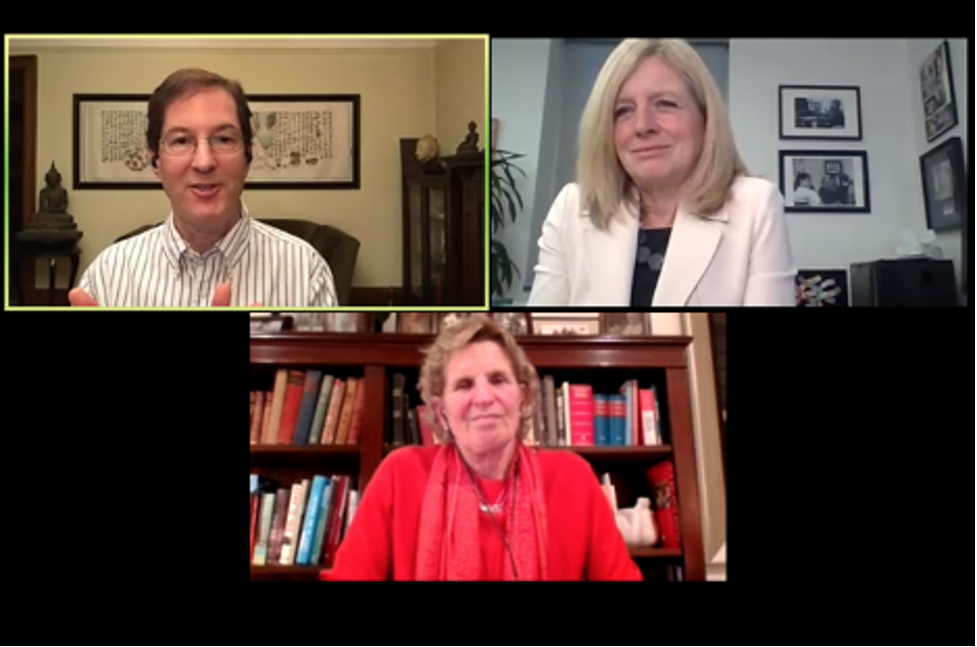The former premiers discussed the virtues of having women in leadership roles and the danger of zero-sum politics

former premiers Rachel Notley (top right) and Kathleen Wynne (bottom).
Former premiers Rachel Notley and Kathleen Wynne visited Ryerson virtually Thursday evening to discuss women in power. They spoke about how the conversation can change from combative to collaborative when women have a seat at the table, and why that approach is needed in Canadian politics.
There have only been 13 female first ministers in the history of Canada (of over 300 total), but there were six women in power provincially when Kathleen Wynne assumed the premiership of Ontario in 2013.
In one of her first meetings that year with Canada’s provincial and territorial premiers, the first ministers supported Indigenous leaders’ call for a national inquiry into missing and murdered Indigenous women and girls.
“I can tell you categorically that because of the meeting with leadership of Indigenous people, it was women at the table who basically structured the discussion so that it was impossible for the men not to agree,” said Wynne.
By the time Rachel Notley won Alberta’s premiership in 2015, there were only three female first ministers.
“I saw the difference between that table and the table where it was just Rachel and Christy (Clarke) and me,” said Wynne. “And it was different.”
Notley says there has been a different tone in the legislature since 2019, when Alberta’s New Democrats lost their majority, and she became leader of the Opposition.
“There’s definitely a very different approach to the way we do our work,” said Notley. “I would say that, generally speaking, I’ve found (women) to be more wanting to hear all the facts and more willing to hear things out.”
This has been true in Canadian politics and internationally as women in charge have impacted not only the political process, but the outcomes. Countries with female leaders have had better responses to the coronavirus pandemic, according to studies reported in The New York Times, Forbes, The Guardian, Washington Post, BBC, CNN, The Conversation, Business Insider and many other publications.
But Notley and Wynne say that it’s not just leadership, but the conversation that is different with more women in power.
“Having a critical mass of women at the table means that different issues are discussed. But I would add to that — there is often a different sensibility, there’s a different way of interacting, and there’s a different commitment to substance,” said Wynne.
She added the majority of women she knows in politics got involved because they were really concerned about an issue or wanted to advance a cause. “They felt that there was a need for a levelling of the playing field or a justice reset,” said Wynne.
Both Wynne and Notley acknowledged that there is still progress to be made in terms of gender parity in cabinets.
“When you have women at the table in the right numbers — I mean, it’s 30 per cent (now) — but if you had 50 per cent, you talk about different issues and you solve different problems in a different way,” said Wynne.
Notley added that, as a point of principle, since women make up 50 per cent of the population they should have 50 per cent of the decision-making power.
Conspicuously absent was criticism of their successors, premiers Jason Kenney and Doug Ford — although neither Notley nor Wynne mentioned their successors by name, both brought up their provincial governments’ responses to COVID-19.
“The conversation we’re having in Alberta right now at 5,000 decibels is, ‘Do you work to protect public health? Or do you protect the economy?’ And to me, when you create these false dichotomies, you invariably ensure failure on both issues,” said Notley.
Both former premiers extolled the virtues of working with other provinces and not treating politics like a zero-sum game.
Caroline Cochrane, premier of the Northwest Territories, is the only current female first minister. However, both Notley and Wynne have continued to stay in politics, and Notley hopes to regain a majority in the Alberta legislature.
The event was part of Ryerson’s Democracy Forum series and was moderated by Martin Regg Cohn of the Toronto Star.
